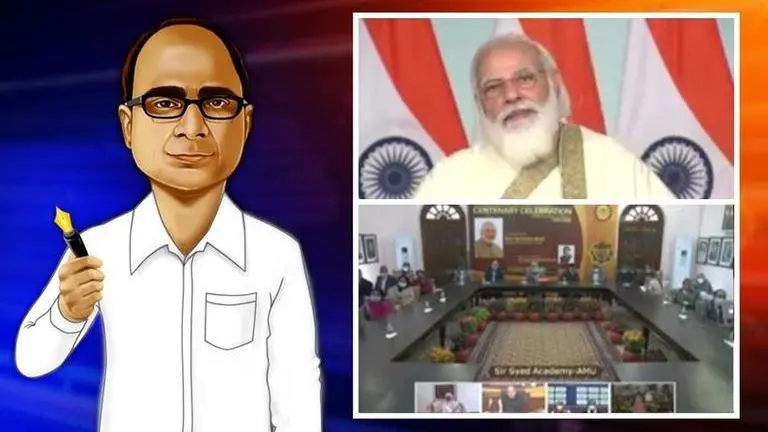Updated 22 December 2020 at 15:34 IST
PM Modi's AMU centenary address: A Call To Find Common Ground
Politics can wait, but society cannot. Nation’s development can’t. Poor, be they of any community, can’t wait.
- Opinion News
- 4 min read

AN outreach and a message to Muslim community, particularly the youth - that’s what Prime Minister Narendra Modi’s address was to the students, alumni, and faculty of the Aligarh Muslim University (AMU) marking centenary of the institution that has come to be associated with Muslim renaissance pre-independence, and a marker of Muslim psyche post 1947.
Set up in the aftermath of the 1857 first war of independence – called mutiny by the British – the Aligarh school of thought has had a complex relationship with India, particularly the Indian State. The fact that AMU’s status as a minority institution has been a matter of legal dispute for the entire period of independence reflects that complexity in good measure. The matter is still pending before a 7-judge bench of the Supreme Court. But more of this some other time.
Given this backdrop, Prime Minister’s speech addressed multiple audiences. For one, he acknowledged the contributions of the Aligarh school in nation building from freedom struggle onwards. By mentioning the pride that Aligarh alumni associate with their alma mater world over, and the presence of over a thousand foreign students on campus, Modi underscored the soft power potential of the school. He then petitioned them to leverage that goodwill and get involved in projects that dovetail with diamond jubilee of India’s freedom next year. His saying that politics is only a small part of a society’s aspirations, and that we should not miss the larger national objectives like poverty alleviation through education gains significance in the light of last year’s protests over the Citizenship Amendment Act (CAA). Along with the Jamia Milia Islamia of Delhi, the AMU had become the hotbed of Muslim protests against the law, with the campus shutting down briefly following a law-and-order situation.
Addressing a wider Muslim audience across the country, Prime Minister underscored the religion-neutral aspects of his government, and indeed the philosophy of his governance. How schemes like the Swachta Mission – and the toilets built – have directly impacted the school dropout rate among Muslim girls thus improving overall enrolment for the community. Or that Ayushman Bharat does not differentiate between citizens based on religion in providing healthcare insurance. Showcasing the fact that Begum Sultana, the first Chancellor of AMU was a woman, Prime Minister called for a gender-sensitive development, slipping in the triple talaq law as a modern legislation that helps the community. It was an important mention given the orchestrated protests that the country saw on the lines of Shah Bano case of 1985-86 when it was passed last year. This also contained a message to his core right wing constituency to appreciate the nuance of a State that engages with every citizen without referring to the religion of the subject.
Advertisement
The outreach did not stop there. I think Prime Minister was fully conscious of the fact that Aligarh represents the Muslim sentiment, and he was addressing that. In that context, his saying that politics can wait for a larger societal objective, and that we need to find a common ground, should be the most important takeaway for the Muslim youth. “Ideological differences are natural in a society. But they should be set aside when it comes to national objectives...like the freedom generation found common ground around independence, present generation should find a common ground for a new India,” he said, adding that the common ground would not be found around politics. “Politics can wait, but society cannot. Nation’s development needs can’t. Poor, be they of any community, can’t wait. Differences have led to lot of wastage of time past century. Let's not waste time now. Everyone has to come together for a common objective of a new India.”
India’s first PM Jawaharlal Nehru had also addressed AMU in 1948. With partition looming large, Nehru could not help but bring in the Hindu-Muslim divide in his speech, even mentioning the confusion in the minds of those present in his audience about their relationship with India as Muslims. It’s vice chancellor at independence, Zahid Husain, chose the other side and was made Pakistan’s first high commissioner to India. Close to Jinnah, he went on to become the first Governor of the State Bank of Pakistan. Today, PM Modi has initiated a constructive dialogue with the Muslims of India through his address to the AMU community today. Hope it becomes a debate not just on AMU campus but across the country and the community.
Advertisement
Published By : Abhishek Kapoor
Published On: 22 December 2020 at 15:34 IST
